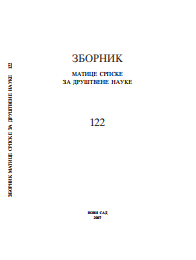МИЛОСТИЊА У СРБИЈИ 1804–1840. ГОДИНЕ
ALMS IN SERBIA 1804–1840
Author(s): Gordana Kaćanski UdovičićSubject(s): Christian Theology and Religion, Welfare systems, 19th Century
Published by: Матица српска
Keywords: charity; monasteries; monks;
Summary/Abstract: The word (notion) alms or pisanija signified the house-to-house collection of small amounts of money for the Orthodox Christian monasteries in Serbia and beyond its borders. In one case (1831/1832), it was collected for the inauguration of the metropolitan and two bishops. There are no grounds for the assumption that the giving of alms originated in the times of Nemanji} rule (XII–XV century), in view of the fact that, in those centuries, the monasteries were largely endowed by the rulers and the nobility – placing their subjects under obligation by law, and in material terms. When the development of the Serbian nation was violently interrupted by enslavement under the Ottoman Turks, there were periodical outbreaks of religious arrogance with the destruction of the Serbian monasteries and the flight of their monks. Tradition – preserving the great memory of the size and importance of the monasteries in its own ways – was flawlessly handed down through the centuries. During the times of Ottoman rule, the people undertook the task of maintaining the monasteries by working for them and giving alms, in the measure they were able to in those conditions of general hardship. ‘Our ancestors’ served as a model to them. After 1815 and specially after the autonomy of the Principality of Serbia in 1831, the emerging state (of Prince Miloš) supported this spontaneously born tradition and approved the giving of alms. The monks themselves collected them with the approval and support of the state, for their respective monasteries. The monasteries were obliged to collect alms because there were very few monks – sometimes one or two, and rarely more in each monastery. Alms were also collected by the civil or ecclesiastical authorities if it involved the Church of the Holy Sepulchre in Jerusalem. In that case, alms were considered to be a kind of obligatory contribution and lost their essential feature – of being voluntary.
Journal: Зборник Матице српске за друштвене науке
- Issue Year: 2006
- Issue No: 122
- Page Range: 105-119
- Page Count: 15
- Language: Serbian

